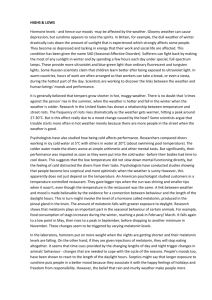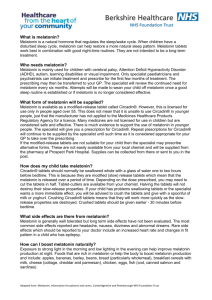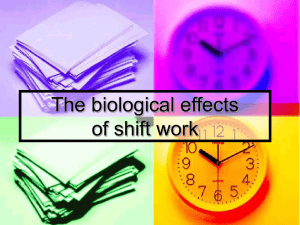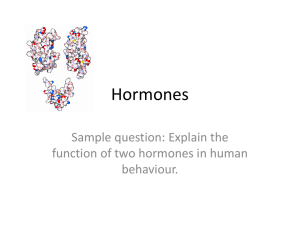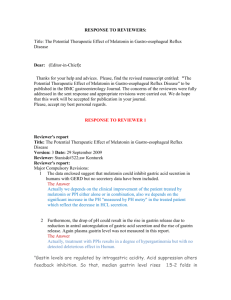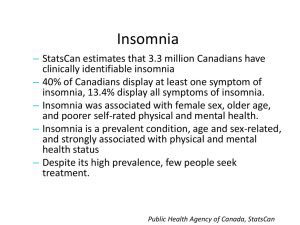Child Information Sheet 9-12 years
advertisement
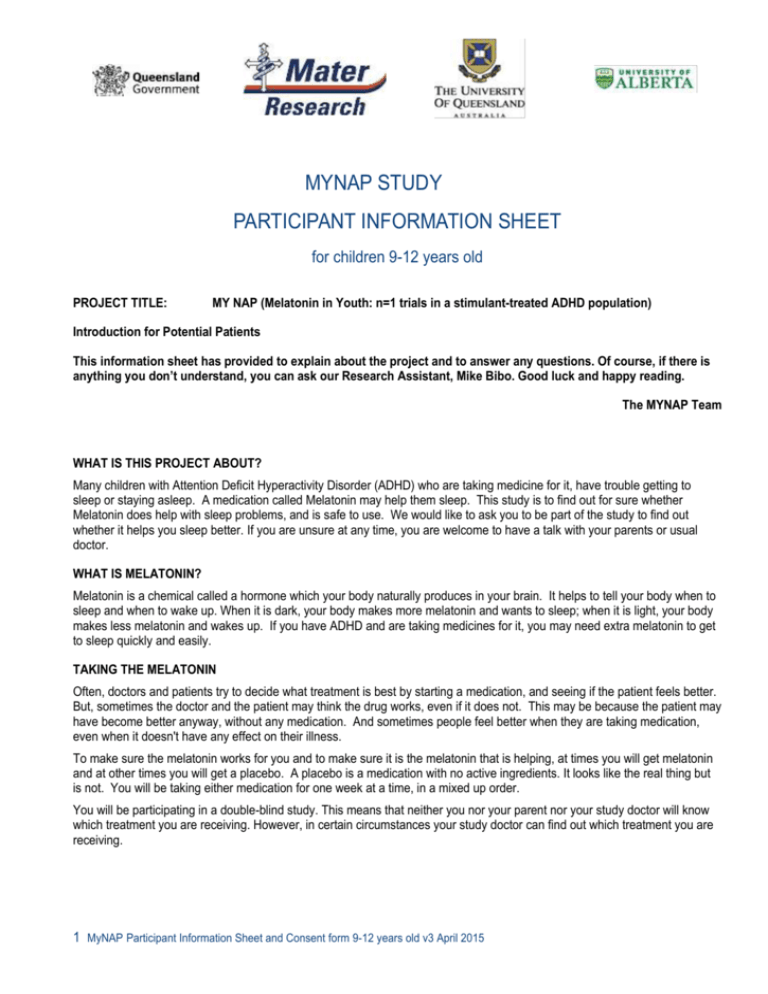
MYNAP STUDY PARTICIPANT INFORMATION SHEET for children 9-12 years old PROJECT TITLE: MY NAP (Melatonin in Youth: n=1 trials in a stimulant-treated ADHD population) Introduction for Potential Patients This information sheet has provided to explain about the project and to answer any questions. Of course, if there is anything you don’t understand, you can ask our Research Assistant, Mike Bibo. Good luck and happy reading. The MYNAP Team WHAT IS THIS PROJECT ABOUT? Many children with Attention Deficit Hyperactivity Disorder (ADHD) who are taking medicine for it, have trouble getting to sleep or staying asleep. A medication called Melatonin may help them sleep. This study is to find out for sure whether Melatonin does help with sleep problems, and is safe to use. We would like to ask you to be part of the study to find out whether it helps you sleep better. If you are unsure at any time, you are welcome to have a talk with your parents or usual doctor. WHAT IS MELATONIN? Melatonin is a chemical called a hormone which your body naturally produces in your brain. It helps to tell your body when to sleep and when to wake up. When it is dark, your body makes more melatonin and wants to sleep; when it is light, your body makes less melatonin and wakes up. If you have ADHD and are taking medicines for it, you may need extra melatonin to get to sleep quickly and easily. TAKING THE MELATONIN Often, doctors and patients try to decide what treatment is best by starting a medication, and seeing if the patient feels better. But, sometimes the doctor and the patient may think the drug works, even if it does not. This may be because the patient may have become better anyway, without any medication. And sometimes people feel better when they are taking medication, even when it doesn't have any effect on their illness. To make sure the melatonin works for you and to make sure it is the melatonin that is helping, at times you will get melatonin and at other times you will get a placebo. A placebo is a medication with no active ingredients. It looks like the real thing but is not. You will be taking either medication for one week at a time, in a mixed up order. You will be participating in a double-blind study. This means that neither you nor your parent nor your study doctor will know which treatment you are receiving. However, in certain circumstances your study doctor can find out which treatment you are receiving. 1 MyNAP Participant Information Sheet and Consent form 9-12 years old v3 April 2015 PARTICIPANTS We will be looking to find 300 children for this study, with 150 children in each of Australia and Canada. You will be able to take part if you: Are between the age of 6 and 17 years Have a diagnosis of ADHD Are taking stimulant medication such as dexamphetamine or methylphenidate (Ritalin or Concerta Extended Release) And have a problem getting off to sleep. If already taking melatonin this does not stop you taking part in the study but this melatonin would need to be ceased for 2 weeks before the study starts and during the study. WHAT WILL HAPPEN DURING THE STUDY? Before you begin What you are reading now is the information sheet which has 4 pages. Please make sure you have read every page and discussed any words you are not sure of with a trusted adult. We will also give you an information sheet for your doctor so that you may talk with him or her about it if you wish. Before deciding whether or not to take part you may like to discuss the matter with your parents as well. You are very welcome to do this. If you have any questions please ask your parent to get in touch with the study coordinators on the phone numbers given at the end of this information sheet. Sleep Behaviour Screening Phase At the start of the study we will ask you and your parent to fill in a short questionnaire. Then we will talk to you and your parents and family about some simple ways to help you get to sleep. Then, for two weeks, we will ask you to try these ways to help you sleep and, with your parent, to keep a sleep diary about things like how long it takes you to get to sleep each night. During this part of the study you will get to wear a special watch that records how active you are and when you sleep. The special watch looks like a small digital watch. It is generally fairly tough, but you would need to remove it when swimming or showering. If at the end of 2 weeks you still have a sleep problem you can take part in the melatonin medication part of the study. Trial commencement The next phase of the study is when you start taking the melatonin and placebo medications in a mixed-up order. This will be for six weeks. The medications will come out to you in a pack telling you and your parent which medication you are to take each day. You and your parent will need to keep a sleep diary of the time you go to bed, the time you wake up in the morning and any time you wake up during the night. You will also need to wear the watch mentioned above for this phase of the study. This will help us find out how useful the melatonin has been in helping you get to sleep but also in improving your waking patterns during the night. Your parent will also be keeping track of your day time behaviour and sleepiness in a special diary throughout the study. This will only take 5 minutes each time. 2 MyNAP Participant Information Sheet and Consent form 9-12 years old v3 April 2015 WHAT WOULD HAPPEN AFTER THE STUDY? At the end of the study, you, your parent and your doctor will be told when you were taking the active (real) medication and when you were taking the placebo. Your sleep diaries will be assessed and the results sent to your doctor. After looking at these results, you, your parent and your doctor will be able to decide if the melatonin medicine works for your case. Your parent will be asked to fill out a short questionnaire at the end of the study, to ask about your experiences of being in the study, how useful you thought it was in finding out the best treatment for you, anything you might have found difficult about the study, and what we might do about it. Again, this should take no more than ten minutes. Three and twelve months after the end of the study, you will be asked to fill out another one week sleep diary and a short questionnaire about your sleep patterns and your life in general. Someone from our team may also ring to ask your parent about your current medication and sleep patterns. POTENTIAL RISKS In this study the active medication is melatonin. Melatonin has been mainly used to treat sleep problems in adults. It has also been used for children’s sleep problems, but not many studies have tested its use by children, and particularly by children with ADHD on medication. Medications sometimes have effects other than making you better. These are called side-effects. A very small number of children who were given melatonin for a long time experienced side effects such as sweating, dizziness, headache, nausea (feeling sick) and daytime sleepiness. These side effects went away as soon as they stopped taking the melatonin. In this study you will only be taking melatonin for a much shorter time. Your parents have been given a complete list of the possible side-effects of melatonin. If you do start experiencing side effects, tell your parent straight away, and they can check with the study staff and your doctor whether you should stop taking the melatonin. BENEFITS TO THE PARTICIPANT This trial will give you, your parent and your doctor clear information as to whether melatonin works for you to help you sleep. If so, your doctor may recommend to you and your parent that you continue taking it. Other benefits will not necessarily directly affect you, but will help us work out how well melatonin works for children who have a diagnosis of ADHD and a sleeping problem. CONFIDENTIALITY The information you and your parent record on your sleeping patterns every day will be stored on a special database, but without your name or other identifying information attached. No-one outside the study team will be able to know who the information belongs to. All personal information and test results collected during the project will be stored securely and will only be available to doctors, researchers and scientists involved in this project. The information can then be made available if you wish to your treating doctor. Data from this project may be published in medical journals or presented at scientific conferences and if this occurs you should know that the names of individual participants will not be used. CONSENT A signed agreement form (called a Consent Form) must be returned to our Research Assistant before commencing the study. PARTICIPATION AND WITHDRAWAL You do not have to take part in the research. Your normal medical treatment will not be affected in any way by your decision whether or not to participate in this project. If you decide you no longer want to participate, you may withdraw at any stage if 3 MyNAP Participant Information Sheet and Consent form 9-12 years old v3 April 2015 you choose, with no disadvantages. However, you should know that if you withdraw from the study you will not be able to withdraw any information that has already been collected and analysed about you. WHO IS DOING THIS STUDY? This project is part of an International study being undertaken by The University of Queensland, Brisbane and the University of Alberta, Canada. In Queensland the study is being co-ordinated by the Centre for Primary Care Research, University of Queensland and is being supported by the Lady Cilento and Mater Children’s Hospitals. The lead researchers in Queensland are Professor Geoff Mitchell, Dr Hugh Senior and Dr Jane Nikles from the University of Queensland, and Associate Professor Honey Heussler from the Lady Cilento Children’s Hospital. A University of Queensland Medical student, Andrew Koo, will also be involved in the project. In Canada, the project is being carried out at the Stollery Children’s Hospital in Edmonton Canada, headed by Professor Sunita Vohra. CONTACT DETAILS Questions or concerns can be answered at any time during the project by contacting one of the study team on 07 3381 1579. ETHICS APPROVAL This project will be carried out according to the National Statement on Ethical Conduct in Research Involving Humans (May 2007, updated in 2013) produced by the National Health and Medical Research Council of Australia. Additionally, this project has been approved by the Children's Health Queensland Hospital and Health Service - Human Research Ethics Committee and the Mater Health Services – Human Research Ethics Committee. If parents/guardians have any concerns or complaints about the conduct of the research, they may use the following contacts: Hospital Contact person Lady Cilento Children’s Hospital Research Governance Officer, Children's Health Queensland Hospital and Health Service Email: CHQ_Research@health.qld.gov.au Mater Children’s Hospital Research Ethics Coordinator, Mater Research Ethics Department. Email: research.ethics@mmri.mater.org.au Ipswich Hospital Administrator, Human Research Ethics Committee West Moreton Hospital and Health Service Email: wmhsd_ethics@health.qld.gov.au FEEDBACK TO PARTICIPANTS Once the last participant has finished the study treatment and all data from this research have been analysed, we will be able to discuss the overall findings with you and/or your doctor on request. If you have any reservations about you and/or your GP being informed about the study results, please let us know of your concerns. You are encouraged to ask questions at any time during your participation in the melatonin study. If you would like more information or have concerns or complaints please contact the IMET service on 07 3381 1579. 4 MyNAP Participant Information Sheet and Consent form 9-12 years old v3 April 2015 PRINCIPAL INVESTIGATORS: Australian Team Tel 07 33811363 Mob 0412 775 117 Prof Geoff Mitchell School of Medicine UQ g.mitchell@uq.edu.au Dr Jane Nikles School of Medicine UQ uqjnikle@uq.edu.au A/Prof Honey Heussler Lady Cilento Children’s Hospital h.heussler@health.qld.gov.au Tel 07 3068 3815 Dr Hugh Senior School of Medicine h.senior@uq.edu.au Tel: 0733811597 Tel 07 3381 1577 Canadian team leaders Prof Sunita Vohra CARE program for integrative Health and Healing- University of Alberta Dr Manisha Witmans Director Northern Alberta Sleep Laboratory Stollery Children’s Hospital, Alberta Canada. 5 MyNAP Participant Information Sheet and Consent form 9-12 years old v3 April 2015 PARTICIPANT CONSENT FORM MYNAP STUDY (Melatonin in Youth: n=1 trials in a stimulant-treated ADHD population) I confirm that I have: Read and understood the Participant Information Sheet; Had any questions answered to my satisfaction; Been informed of the possible risks or side effects of the medication; Understood that participating in this study will require me to take a tablet every day that will contain either melatonin or no active ingredient (placebo). Been told that any information about me will be kept confidential and Agreed to participate in the study, including 2 questionnaires and/or phone calls for my parent/guardian 3 and 12 months after the IMET finishes I am happy for my doctor________________________________ to be told of my results: Yes I am happy for my information (without my name attached) to be used to answer other questions relating to this research project that may come up in the future: Yes No I consent to my study ( medical) records being inspected if necessary by other people outside the study team but understand that my name will not be disclosed to anyone outside the hospital. I would like to be told about the overall results of the study after it is completed: Signatures: Yes [ T ..................................................................................................................................y p Participant’s Parent/Guardian Date e No No ..................................................................................................................................a Participant Date q u ................................................................................................................................. o t Chief or Principal Investigator Date e A copy of the Information sheet and the signed Consent Form will be provided to the participant’s parent/guardian. f r o m 6 MyNAP Participant Information Sheet and Consent form 9-12 years old v3 April 2015 t h e d o MELATONIN CONSUMER MEDICATION INFORMATION NAME OF THE PRODUCT Melatonin 3 immediate-release tablets QUALITATIVE AND QUANTITATIVE COMPOSITION Each tablet contains 3 mg melatonin. Each tablet contains some inactive ingredients. WHAT IS IN THIS LEAFLET This leaflet contains answers to some common questions about MELATONIN. It is particularly important that you read the sections "When to take it" and "How to take it" before you take this medicine. The leaflet does not contain all the information that is known about Melatonin. It does not take the place of talking to your doctor or pharmacist. All medicines have risks and benefits. Your doctor has weighed the risks of you taking MELATONIN against the benefits they expect it will have for you. If you have any concerns about taking this medicine, ask your doctor or pharmacist. Keep this leaflet with the medicine. You may need to read it again. WHAT MELATONIN IS USED FOR MELATONIN is used to improve sleep quality and morning alertness in people with poor quality of sleep. The active substance of MELATONIN, melatonin (not of plant or animal origin), belongs to a group of naturally occurring hormones produced in the body. Melatonin works by controlling the circadian rhythms and increasing the ability to sleep. This medicine is only available with a doctor's prescription. Melatonin is not addictive. BEFORE YOU TAKE MELATONIN When you must not take it: Do not take MELATONIN if you are allergic to it or any of the ingredients listed at the end of this leaflet. Symptoms of an allergic reaction may include shortness of breath, wheezing or difficulty breathing, swelling of the face, lips, tongue or other parts of the body, or rash, itching or hives on the skin. Do not take MELATONIN if you have been drinking alcohol or intend to drink alcohol or believe that you may have alcohol in your blood stream. 7 MyNAP Participant Information Sheet and Consent form 9-12 years old v3 April 2015 Do not take it after the expiry date printed on the pack. If you take it after the expiry date has passed, it may not work as well. The expiry date refers to the last day of the month. Do not take it if the packaging is torn or shows signs of tampering. If you are not sure whether you should start taking MELATONIN talk to your doctor. Before you start to take it: Tell your doctor if: 1. you have any allergies to any other medicines or any other substances, such as foods, preservatives or dyes. 2. you have, or have had the following medical conditions: • suffer from liver problems • suffer from kidney problems • you suffer from an autoimmune disease • you have a rare hereditary problem of galactose intolerance, the LAPP lactase deficiency or glucose-galactose malabsorption If you have not told your doctor about any of the above, tell him before you use MELATONIN. Taking other medicines Tell your doctor if you are taking any other medicines, including any that you buy without a prescription from your pharmacy, supermarket or health food shop. Some medicines may affect the way other medicines work. Some medicines and MELATONIN may interfere with each other. These include: • hypnotics and tranquilisers (e.g. benzodiazepines), • fluvoxamine, thioridazine and imipramine (used to treat depression or psychiatric problems), • oestrogen (contraceptives or hormone replacement therapy), • cimetidine and psoralens (used to treat skin problems e.g. psoriasis) • Alcohol • Caffeine The effect of adding MELATONIN to other medicines used to treat insomnia has not been examined. It is not known if MELATONIN will increase or decrease the effects of other treatments for insomnia. Your doctor or pharmacist has more information on medicines to be careful with or avoid while taking MELATONIN. HOW TO TAKE MELATONIN How much to take Take MELATONIN only when prescribed by your doctor. Every night, take the number of tablets recommended by your doctor. 8 MyNAP Participant Information Sheet and Consent form 9-12 years old v3 April 2015 There is no evidence that taking more than the recommended dose will increase the effect of MELATONIN. How to take it Put the tablet under your tongue until it dissolves. Do not crush, chew or divide your tablet. If you crush, chew or divide the tablet they will not work properly. Follow all directions given to you by your doctor carefully. They may differ from the information contained in this leaflet. If you do not understand the instructions on the bottle, ask your doctor or pharmacist for help. When to take it After food, 30 minutes before you go to bed. How long to take it It is important that you continue taking MELATONIN for as long as your doctor prescribes. MELATONIN may be continued for up to thirteen weeks. If you forget to take it If you forget to take your melatonin, take another as soon as you remember, before going to bed or wait until it is time for your next dose. Do not take a double dose to make up for a forgotten dose. If you are not sure what to do, talk to your doctor or pharmacist. If you have trouble remembering to take your MELATONIN, ask your pharmacist for some hints. IF YOU TAKE TOO MUCH (OVERDOSE) Immediately telephone your doctor or Poisons Information Centre (In Australia 13 11 26), or go to accident and emergency at your nearest hospital, if you think that you or anyone else may have taken too much MELATONIN. Do this even if there are no signs of discomfort or poisoning. WHILE YOU ARE USING MELATONIN Things you must do If you are about to be started on any new medicine tell your doctor and pharmacist that you are taking MELATONIN. Tell any other doctors, dentists and pharmacists who treat you that you are taking this medicine. Things you must not do Do not give MELATONIN to anyone else, even if they have the same condition as you. Do not take more than the recommended dose unless your doctor tells you to. 9 MyNAP Participant Information Sheet and Consent form 9-12 years old v3 April 2015 Do not use this medicine to treat any other complaints unless your doctor tells you to. Do not drink alcohol before or after taking this medicine Things to be careful of MELATONIN rarely causes drowsiness, nevertheless it is not recommended to drive or operate machinery for 8 hours after you take it. Melatonin does not impair morning alertness, but if you suffer from drowsiness during the day you should consult your doctor. SIDE EFFECTS Tell your doctor or pharmacist as soon as possible if you do not feel well while you are taking MELATONIN. MELATONIN has been shown to improve the sleep of most people, but it may have unwanted side effects in a few people. All medicines can have side effects. Sometimes they are serious, but most of the time they are not. You may need medical treatment if you get some of the side effects. Ask your doctor or pharmacist to answer any questions you may have. Tell your doctor if you notice any of the following and they worry you. These are considered to be uncommon side effect in adults (i.e., likely to occur in fewer than 1 in 100 patients): Irritability, nervousness, restlessness, insomnia, abnormal dreams, anxiety, migraine, lethargy, psychomotor hyperactivity (restlessness associated with increased activity), dizziness, somnolence (tiredness), high blood pressure, (upper) abdominal pain, indigestion, mouth ulceration, dry mouth, hyperbilirubinaemia (changes in the composition of your blood which could cause yellowing of the skin or eyes ( jaundice), inflammation of the skin (dermatitis, night sweats, pruritis (itching), rash, dry skin, pain in extremities, menopausal symptoms, asthenia (feeling of weakness), chest pain, excretion of glucose in urine, excess proteins in the urine, abnormal liver function and weight increase. The following events are considered to be rare (i.e., likely to occur in fewer than 1 in 1,000 adults): Shingles, reduced number of white blood cells in the blood, decreased number of platelets in the blood, high level of fatty molecules in the blood, severe chest pain due to angina, feeling your heartbeat (palpitations). low serum calcium levels in the blood, low sodium levels in the blood, altered mood, aggression, agitation, crying, stress symptoms, disorientation, early morning awakening, increased sex drive, depressed mood, depression, loss of consciousness or fainting, memory impairment, disturbance in attention, dreamy state, restless legs syndrome, poor quality sleep, 'pins and needles' feeling (paresthesia) reduced visual acuity (visual impairment), blurred vision, watery eyes, dizziness when standing or sitting, vertigo, hot flushes, gastro-oesophageal reflux, gastrointestinal disorder, blistering in the mouth, tongue ulceration, gastrointestinal upset, vomiting, abnormal bowel sounds, flatulence (wind), salivary hypersecretion (excess saliva production), halitosis (bad breath), abdominal discomfort, gastric disorder, inflammation of the stomach lining, , eczema, erythema (skin rash), hand dermatitis, psoriasis, pruritic rash (itchy rash), nail disorder, arthritis, ,muscle spasms, , neck pain, night cramps, increased duration of erection, inflammation of the prostate gland, tiredness, pain, thirst, passing large volumes or urine, presence of red blood cells in the urine, urination during the night, increased liver enzymes, abnormal blood electrolytes and abnormal laboratory tests. Melatonin is not addictive. Other side effects not listed above may also occur in some patients. Tell your doctor if you notice any other effects. 10 MyNAP Participant Information Sheet and Consent form 9-12 years old v3 April 2015 Do not be alarmed by this list of possible side effects. You may not experience any of them. AFTER USING MELATONIN Storage Keep your tablets in the bottle until it is time to take them. If you take the tablets out of the bottle they may not keep well. Keep MELATONIN away from sunlight. Keep the medicine at room temperature, between 15 and 25 degrees Celsius. Do not store it or any other medicine in the bathroom, near a sink, or on a window-sill. Do not leave it in the car. Heat and damp can destroy some medicines. Keep it where children cannot reach it. A locked cupboard at least one-and-a-half metres above the ground is a good place to store medicines in general. DISPOSAL If your doctor tells you to stop taking the tablets or the tablets have passed their expiry date, do not take any more tablets Return any unused medicine to the IMET service. 11 MyNAP Participant Information Sheet and Consent form 9-12 years old v3 April 2015
